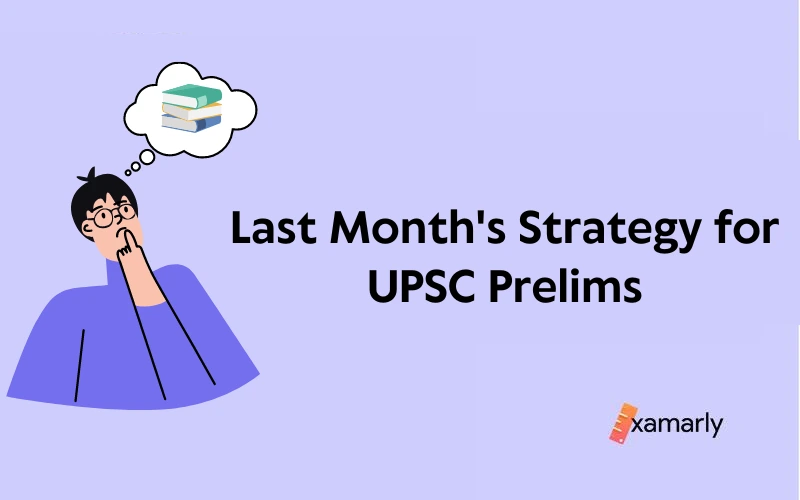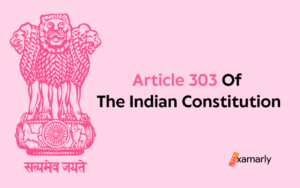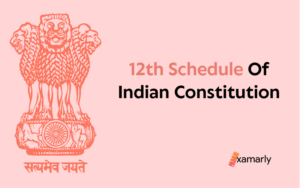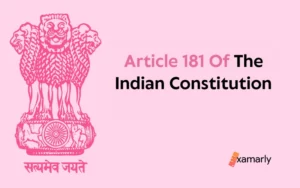Are you looking for last month’s strategy for UPSC prelims? The month before UPSC Prelims is the crucial time when many of the UPSC aspirants panic and take stressed a lot instead of going into exam mode. Tailor your last-month strategy for the UPSC Prelims according to your needs and spend your energy on making the most of the month approaching the UPSC Prelims rather than worrying.
No doubt you have put energy into completing the syllabus, revision, and practising but a month before Prelims is important from the point of making the effort (of the whole year) count
In a UPSC or any other exam, it is essential to revise the last month before the exam otherwise there might be a possibility of forgetting your concepts. To make your attempt fruitful last month should be for evaluating, recapping, and reinforcing.
This article takes you through last month’s strategy for UPSC Prelims so that UPSC aspirants can utilize it to make themselves 100% ready for UPSC Prelims.
- UPSC Prelims Preparation
- How To Plan Your Last Month Strategy For UPSC Prelims Exam
- 1. Divide Your UPSC Syllabus
- 2. Stepping From Weaker To Stronger Sections
- 3. Prepare Effectively from NCERT Books
- 4. Revision From Notes
- 5. Keep Current Affairs on Your Finger Tips
- 6. Attempt Quizzes Weekly
- 7. Previous Year Papers Are Important
- 8. Manage Your Time & Resist Yourself From New Topics
- 9. Focus On CSAT
- Minor Yet Effective Last Minute Preparation Tips For UPSC Civil Services Exam
- Conclusion
- Frequently Asked Questions
- What is the best strategy for UPSC Prelims last month's preparation?
- How many hours should I study for UPSC Prelims in the last month?
- How to revise the syllabus in the last month for UPSC Prelims?
- Is it possible to crack UPSC Prelims in the last month?
- What should be the priority for last month's UPSC Prelims preparation?
- How to improve accuracy in UPSC Prelims in the last month?
- What are the most important topics for UPSC Prelims last month's preparation?
UPSC Prelims Preparation
UPSC (Union Public Service Commission) Prelims is the first step towards the prestigious Indian Administrative Service (IAS) examination. Preparation for the UPSC Prelims examination typically involves the following steps:
- Study the syllabus: Start by thoroughly understanding the UPSC syllabus and exam pattern.
- Start from the weaker and venture into the stronger: Divide your preparation with this strategy, start preparing weaker sections and prepare strong ones.
- Read NCERT textbooks: NCERT textbooks are considered the best source for understanding the fundamental concepts in each subject
- Read standard reference books and create notes: In addition to NCERT textbooks, it is important to read standard reference books for a more in-depth understanding of the subjects.
- Keep updated with current events: Regularly follow national and international news and events, as a significant portion of the UPSC Prelims exam is based on current affairs.
- Attempt quizzes: Quizzes will help you check the gaps in preparation and how much you should prepare.
- Practice previous years’ question papers: Solving previous years’ question papers will give you an idea of the type of questions that are asked in the examination.
- Time Management: Manage your time effectively, as the UPSC Prelims is a time-bound examination, and it is important to practice solving questions within the given time frame.
- Aptitude questions: Prepare aptitude questions and enhance your UPSC preparation strategy.
By following these steps, you can effectively prepare for the UPSC Prelims examination
How To Plan Your Last Month Strategy For UPSC Prelims Exam
The candidates who have applied to take a competitive exam usually are quite confused about their plan of action in that one month before appearing for an exam.
There are no hard and fast rules regarding preparation and work schedule to be followed at that time, but some planning can be done as per your preference. Last month’s strategy for UPSC is discussed below in brief:
1. Divide Your UPSC Syllabus
Candidates can divide UPSC Syllabus into 4 sections so that they can revise the major portion in the time constraint. Dividing your syllabus into smaller chunks will aid you to track what you have studied or revised and how much is left for you to cover.
Guidelines for Dividing UPSC Syllabus
The UPSC (Union Public Service Commission) syllabus for the preliminary examination is divided into two papers:
- General Studies Paper 1 (GS-1): This paper covers subjects like Indian heritage and culture, history, geography, Indian polity and governance, and economic and social development.
- General Studies Paper 2 (GS-2): This paper covers subjects like international relations, India’s foreign policy, Indian Constitution, and polity, and issues related to development and governance.
Here’s a rough guideline for dividing the syllabus:
- Indian Heritage and Culture: This topic covers ancient Indian history, art and architecture, literature, and philosophy. Allot approximately 2-3 weeks for this subject.
- Indian History: This topic covers ancient, medieval, and modern Indian history. Allot approximately 4-5 weeks for this subject.
- Indian Geography: This topic covers physical geography, human geography, and environmental geography. Allot approximately 3-4 weeks for this subject.
- Indian Polity and Governance: This topic covers the Indian Constitution, political system, and governance. Allot approximately 4-5 weeks for this subject.
- Economic and Social Development: This topic covers India’s economy, poverty, unemployment, and various social issues. Allot approximately 3-4 weeks for this subject.
- International Relations and India’s Foreign Policy: This topic covers international organizations, global issues, and India’s foreign policy. Allot approximately 2-3 weeks for this subject.
- Current Affairs: Regularly follow national and international news and events, as a significant portion of the UPSC Prelims exam is based on current affairs.
Note: The above division of the syllabus is just a rough guideline, and the actual time taken for each subject may vary based on individual pace and preparation.
2. Stepping From Weaker To Stronger Sections
Now arrange your divided sections in such a way that each week you can revise these sections one by one.
Begin with a weaker section of the UPSC Syllabus which will help you to memorize it again if you forget and can also revise it a couple of times before the UPSC Exam.
Later in your revision plan, it is liable that you may revise the stronger sections faster compared to the weaker ones. Hence you can save some amount of time which you can utilize for revising weaker sections or can revise the sections which you revised earlier. This will help you to retain almost every portion of the UPSC Syllabus in your mind.
Consider Examarly to know about your weaker sections in the UPSC syllabus that require your special attention and revision. You can use the Examarly App to give tests and identify the portions that require you to look in again.
3. Prepare Effectively from NCERT Books
Here are some tips to effectively read NCERT books for UPSC (Union Public Service Commission) Prelims preparation:
- Start with Class 6 to 12 NCERT textbooks: Start your preparation with NCERT textbooks of Class 6 to 12 for subjects like history, geography, and polity. These books provide a strong foundation for the subjects that will be covered in the UPSC Prelims exam.
- Read actively: Don’t just passively read through the books. Highlight important points, make notes, and summarize each chapter after reading.
- Understand the concept: Focus on understanding the concept and not just memorizing facts. NCERT textbooks are written in an easy-to-understand language, making it easier to comprehend the subject matter.
- Revise regularly: Regular revision of NCERT textbooks is important to retain the information. Make a revision plan and stick to it.
- Practice questions: After completing each chapter, practice the questions provided at the end of the chapter. This will help you test your understanding and identify areas where you need to focus more.
- Refer to additional resources: NCERT textbooks provide a basic understanding of the subject, but you may need to refer to additional resources for a more in-depth understanding.
4. Revision From Notes
To effectively refer to standard books for UPSC Prelims preparation: make a list of relevant books, focus on one book at a time, understand the author’s perspective, make notes and summarize each chapter and practice questions from the book.
Additionally, make use of online resources like lecture notes, quizzes, and discussion forums to enhance your understanding and test your knowledge. It is also important to prioritize your reading and allocate sufficient time for each book.
Regular revision and practice will help you retain the information and strengthen your preparation.
Last-minute revision from your personalized notes is an essential part of preparation. Firstly, it helps refresh your memory and secondly, it allows you to spot gaps in your preparation.
Most candidates find that their revision strategies involve reading past question papers and marking important sections with highlighters.
However, there are many other methods of revising – answering model test papers over some time works well for some.
Make sure you keep track of which method works best for you and go through it as often as possible during exam time.
5. Keep Current Affairs on Your Finger Tips
Preparation of current affairs is an important aspect of UPSC (Union Public Service Commission) preparation. To effectively prepare for current affairs, it is important to follow reliable news sources like The Hindu, The Indian Express, and other national and international newspapers, and websites.
Make it a habit to read the news daily and allot at least 30 minutes to an hour every day to reading current affairs. While reading the news, make notes of important events, facts, and figures, and categorize the information you gather into different categories like politics, economy, international relations, and others.
Regularly update your notes and categorize the latest information to keep your current affairs preparation up-to-date. Test your knowledge by taking regular current affairs quizzes and mock tests, and focus on the current affairs that are relevant to the UPSC syllabus.
By following these tips, you can effectively prepare for current affairs for the UPSC examination and score well in the General Studies Paper-I of the Preliminary Exam.
6. Attempt Quizzes Weekly
Revise each divided section of the syllabus for 5 days. Then give a quality mock test on the 6th day and analyze your preparation level. Based on your performance in the mock test, revise the one that you are unable to answer.
By revising a couple of times on both the 6th and 7th days you’ll be able to retain what you revise. This part of your last month’s active revision strategy for UPSC Prelims will save you from surprises in the actual exam.
7. Previous Year Papers Are Important
Give equal weightage to practice the previous year’s paper as a revision. The revision will prove to be fruitful if it is done strategically along with solving the previous year’s papers.
Include solving of previous year’s paper in your last month strategy for UPSC Prelims, as solving previous year’s papers, candidates are able:
- To face actual exam day pressure in the exam hall.
- To overcome the anxiety or exam fear else might act as a barrier to your success.
- List out the mistakes you were doing while practising, so that you won’t repeat them at UPSC Exam and give wrong answers (i.e. Refrain from committing the mistakes you did while practising)
- To complete within the time limit.
- Helps you to apply your theoretical knowledge while solving. This will increase your thinking ability also.
8. Manage Your Time & Resist Yourself From New Topics
At this stage, you should resist going through new theories or chapters else everything you have studied will be merged. You don’t have enough time to opt for new concepts or new study material.
Instead, utilize this time for revision which will prove to be fruitful for scoring higher marks in UPSC Exam. To effectively manage time in UPSC (Union Public Service Commission) preparation, prioritize your tasks, create a study plan, allocate sufficient time for each subject, and stick to your schedule.
Make sure to allocate enough time for revision and practice, and leave some buffer time for unexpected situations. Avoid procrastination and distractions, and focus on one task at a time. Taking regular breaks can help you stay fresh and focused.
Utilize your time efficiently and do not waste time on unproductive activities. Stay organized, track your progress, and make adjustments to your schedule as needed. By following these tips, you can effectively manage your time and make the most of your UPSC preparation.
9. Focus On CSAT
The Civil Services Aptitude Test (CSAT) is a crucial part of your preparation strategy. It helps gauge your aptitude, verbal ability, and reasoning skills, so it’s not just about knowing a lot of answers it’s about how quickly you can come up with them on test day.
Focus on this paper is another important part of last month’s strategy for UPSC Prelims, as it is qualifying in nature that requires scoring at least 33% marks for the evaluation of GS paper 1.
Minor Yet Effective Last Minute Preparation Tips For UPSC Civil Services Exam
Besides last month’s strategy for UPSC Prelims, some minor yet effective tips for last-minute UPSC preparation are also discussed here. These are:
- Don’t take stressed or get panic. Panicking might make you waste time thinking about exams instead of doing revisions and studying.
- Stay calm and composed. Focus on executing what you have planned for yourself.
- Eat a balanced diet and stay healthy so that you do not feel uneasy before or during the exam.
- Get at least 7-8 hours of sleep.
- Don’t be overconfident or underconfident, believe in yourself and keep yourself motivated.
- Think about your studies, your dream.
- Don’t get nervous.
- Neither thinks to leave this attempt and take the other.
- Don’t think you haven’t prepared.
- Remember slowly and steadily you can win the battle.
- Have faith and confidence in your hard work. Never step back from hard work.
Don’t waste time on only revision or only on syllabus completion. The revision will be helpful if you can apply your concepts or can use your thinking ability while solving papers. This will help you to make yourself understand whether you can solve your paper in the UPSC Exam.
Don’t go for syllabus completion (i.e. don’t study new topics which you have not studied at all) at the last moment. Just revise those that you have studied so far. This will help you be better in those areas of the UPSC Syllabus that you have studied, or else everything (i.e., old concepts and new concepts) will be tangled in your mind.
Remember “practice makes perfect”. The more you practice, the more your concepts (or learning or thinking ability or intellect) will be polished for UPSC Prelims.
Note: Since everyone is different from one another, our preparation and revision methodology will also be different.
What works for one does not mean that works for another. So you can also chalk out your last month’s strategy for UPSC Prelims as per your capability, capacity, and the set target.
Conclusion
We can only guide you by listing out the ingredients of our secret sauce to last month’s strategy for UPSC Prelims. Applying it is up to you.
We listed out the most important points for your reference and to make your journey a bit easier. Revision plays a vital role these days and that is what you should be focusing on.
Trying to squeeze more topics into your studies at this stage will only make things messy. We hope we provided a definite roadmap to your last month’s strategy for UPSC Prelims and wish you all the best.
Frequently Asked Questions
What is the best strategy for UPSC Prelims last month’s preparation?
A systematic approach that covers all the important topics, practice questions, and mock tests can be considered the best strategy for last-month UPSC Prelims preparation.
How many hours should I study for UPSC Prelims in the last month?
The number of hours to be spent studying for UPSC Prelims in the last month can vary based on individual capability, but a minimum of 8-10 hours a day is recommended.
How to revise the syllabus in the last month for UPSC Prelims?
One can revise the syllabus in the last month by going through important topics, practising questions, and solving mock tests. It is also important to focus on time management and accuracy.
Is it possible to crack UPSC Prelims in the last month?
Yes, it is possible to crack UPSC Prelims in the last month with hard work, dedication, and a well-structured strategy.
What should be the priority for last month’s UPSC Prelims preparation?
The priority for last month’s UPSC Prelims preparation should be given to the subjects that one is not confident about, as well as to revision and practice.
How to improve accuracy in UPSC Prelims in the last month?
Improving accuracy in UPSC Prelims in the last month can be done by practising more questions, taking mock tests, and analyzing the mistakes.
What are the most important topics for UPSC Prelims last month’s preparation?
The most important topics for UPSC Prelims last month’s preparation can vary based on the exam pattern and current affairs, but the focus should be given to the subjects with higher weightage.






